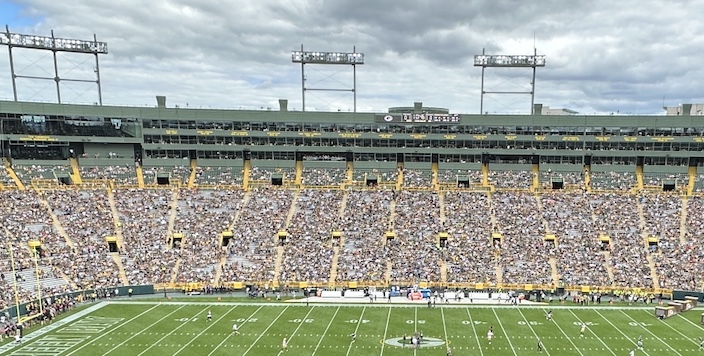A lot of us go into business because we think we can do something differently or better. Produce a tougher widget. Provide better service. Offer stronger solutions.
This past week, a sports publicity issue gnawed at me. The NFL reportedly mandated the Green Bay Packers to hold a moment of silence before its September 11 game against Washington to honor a conservative political activist who was horrifically and unjustifiably murdered the day before.
Other NFL teams were able to decide whether to honor the often-divisive Charlie Kirk. Some did. Major League Baseball didn’t require its teams to honor Kirk, but two acted independently, including the New York Yankees. One Yankees’ season ticket holder shared a letter with me before she sent it because, as angry as she was, she wanted to be sure she didn’t undermine the terror of a life taken.
For background: Kirk wasn’t a dignitary, member of a team or league, or teacher who heroically saved kids’ lives. He was unconscionably gunned down. I feel confident most reading this will agree that we see too many fall victim to violence each day.
This is where PR agents need to pay attention:
The approach businesses take in emotional moments raises a PR question: what happens when an organization is told to act in a way that risks dividing its audience? How do you balance external pressure, social responsibility and reputational impact in your publicity strategy?

This wasn’t a crisis in the usual sense. There were no trending hashtags. No sponsor boycotts. Just silence. And silence in sports PR is tricky. Outrage forces a conversation. Quiet disapproval lingers, invisible but corrosive to trust and credibility.
So the lack of public pushback doesn’t mean approval. It reflects a deeper reality: that speaking up carries professional, social and cultural risks. People weigh the fallout before voicing concerns, and that hesitation quietly shapes public perception. For PR professionals, that’s a clear signal: reputational damage might be happening where you can’t see it.
The Packers’ in-stadium message framed the moment as anti-violence — OK, I’m listening… That it was tied to a single polarizing figure while kids ran from a school shooter a few states away at nearly the same time was puzzling. From a sports publicity standpoint, it missed a chance to leverage a high-profile platform for a broader, credible and inclusive statement.
USA Today’s Jarrett Bell captured the dichotomy perfectly. Singling out someone amidst widespread tragedy risks diminishing the message’s impact and dimming dates that promote good later on. It’s a key PR lesson: how you communicate matters as much as what you communicate.
Even outside sports, these publicity and PR truths apply:
- Decisions carry reputational weight. When external pressure conflicts with values, assess the PR impact before acting.
- Silence isn’t neutral. Quiet disapproval can erode trust as much as public backlash, especially when employees, stakeholders or audiences feel unsafe speaking up.
- Your platform amplifies responsibility. Every statement, tribute or campaign communicates something about your brand.
- Consistency sustains credibility. Align your words and actions. Following the crowd may protect you short-term, but you doing you preserves long-term trust.
- Monitor beyond public reactions. Internal conversations, industry chatter and subtle audience signals often reveal reputational risks before they hit headlines.
The world is sadly fractured. I so wish I could change that with an appeal and digital post. I also understand that some leagues and teams want a public call to stem violence. I simply think there are more powerful and inclusive ways to do it.
Thoughtful publicity and strategic PR shape long-term trust. How organizations handle these moments communicates more than any announcement ever could.
May the memory of every life lost be a blessing. And maybe one day, businesses won’t have to wrestle with choices about whom to honor because we’ll finally stop a violent cycle that creates a longer list.
Pipe dream? Probably. But worth chasing.
###
©2025 Gail Sideman, gpublicity.com